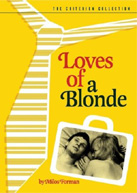Loves of a Blonde (Lásky jedné plavovlásky)
| While the filmmakers of the French New Wave were heralded for their politically minded subversions of the Hollywood "invisible" style of continuity and the Italian Neorealists were praised for the gritty realism they brought to the cinema, the filmmakers of the Czech New Wave in the 1960s did something much simpler, but no less profound: They brought a new level of seriocomic intimacy to the movies by focusing on the oft-overlooked details of human experience. Nothing particularly bold in thematic terms, and certainly not rocking the stylistic boat, the films of the Czech New Wave grabbed audiences by their quiet study of humanity—the little foibles and truths and moments of inadvertent comedy that we all understand, but were so rarely acknowledged in the larger-than-life world of the cinema. Milos Forman's Loves of a Blonde (Lásky jedné plavovlásky) is a perfect example of this trend of filmmaking, which produced what are often referred to as "experiential films." Told with a simple eye toward character and a deep understanding of human weakness and silliness, Loves of a Blonde is a funny, often moving depiction of the youthful romantic urge and the unfortunate disappointment that often follows. When first released, it was a subject of notoriety for its frank depiction of sexual activity (which, of course, now looks blissfully tame), but even then it was impossible to miss the simple pleasures it offers in studying human interaction. The story takes place in Zruc, a tiny industrial town in Soviet-controlled Czechoslovakia in which the women (most of whom were brought there to work in a shoe factory) outnumber the men 16 to 1. The protagonist is a young, blonde-haired woman named Andula (Hana Brejchová)—she's not particularly independent or enterprising, but she is interesting nonetheless because she so fully embodies the immediately recognizable human desire to love and be loved. Of course, when you're competing with 15 other women for each man, the chances of finding true love are slim, so it's hard not to blame her when she goes to bed with a wily young pianist named Milda (Vladimír Pucholt) who comes through town one night to play at a mixer attended by the female factory workers and the men stationed at a nearby military base. The mixer itself is a brilliant and extended comic setpiece that elicits smiles of recognition, rather than guffaws of laugher. During this first section of the film, three unattractive, middle-aged reserve soldiers (Vladimír Mensík, Ivan Kheil, and Jirí Hruby) plot and devise means to get together with Andula and her two friends. The soldiers are a joke, but they don't seem to realize it, and they are so assured of themselves that, when a bottle of wine they send over to Adula and her friends is mistakenly delivered to a different table of girls, they have the audacity to make the waiter return and take it away from them. The middle portion of the film concerns Andula's night spent with Milda. Forman plays carefully with the setup, allowing the situation to gradually develop in a slow, natural progression. Milda ironically uses the excuse of teaching Andula self-defense techniques to wear down her defenses, and she gives in to him sexually, proclaiming that she trusts him more than anyone, perhaps because she needs at that moment to believe such a statement. This portion of the film is about more than sex, though—it is about the conversation and the feelings that go along with it, which is crucial for understanding the film's third act, when Milda turns out to be not what Andula had hoped for. The third section of the film takes place at Milda's family apartment in Prague, where Andula goes hoping to find refuge, but instead discovers Milda's parents (Milada Jezková and Josef Sebanek). Milda's father is distant, but accommodating, but his mother is overbearing and critical, complaining of Andula's simply showing up at their doorstep and none-too-subtly criticizing her lapse in morality. This sequence is both heartbreaking and strangely funny, relying as it does on shattered expectations with sudden doses of reality. If Andula had a romanticized dream, it is broken here; but, it is not a total loss, as she emerges as a character strong enough in our eyes to survive and grow stronger still. When the final shot shows her working as always in they shoe factory, it is not so much a statement of defeat as a return to the drawing board with the ever-present hope that love for her is still out there somewhere. Throughout, director Milos Forman (who would go on to the U.S. to make such films as 1975's One Flew Over the Cuckoo's Nest, 1984's Amadeus, and 1996's The People vs. Larry Flynt) treads carefully between dreams and disappointment, suggesting that one cannot exist without the other, but never falling into complete despair. As Andula, Hana Brejchová (the sister of Forman's then-wife) is a marvel, projecting wide-eyed innocence that is never cloying or insipid, but rather life-affirming and hopeful. Her dreams with Milda may not turn out quite as she envisioned, but she is never completely defeated. Even in the repressive communist-dictated world in which she lives, the possibilities remain.
Copyright © 2002 James Kendrick | |||||||||||||||||||||||||||||||||||||||||||||||
Overall Rating: 


 (3.5)
(3.5)


